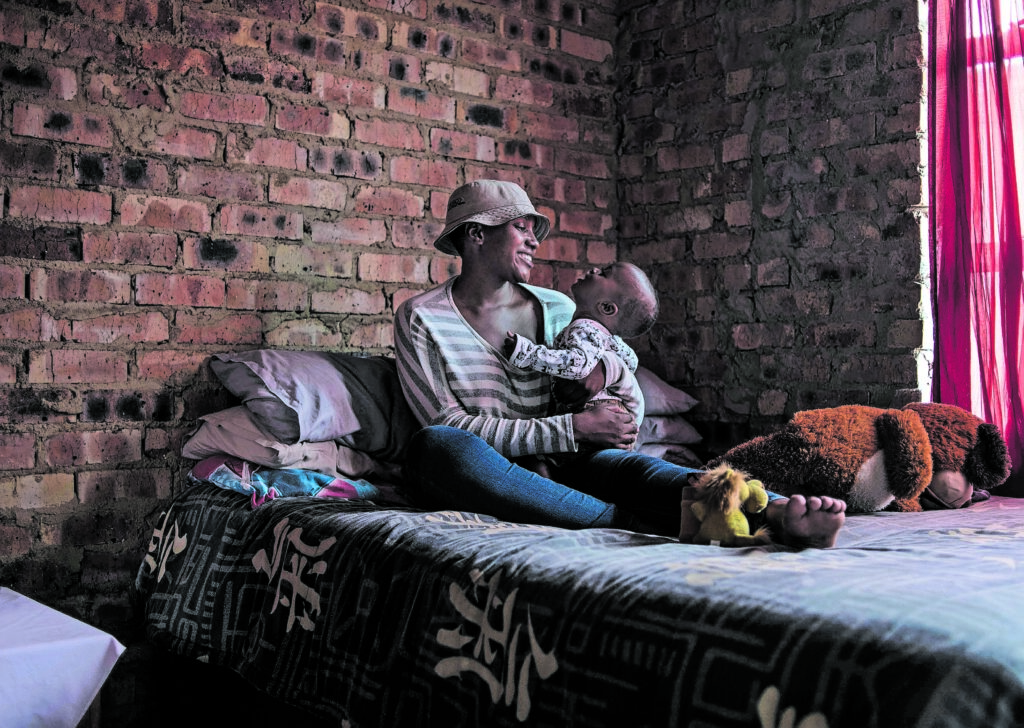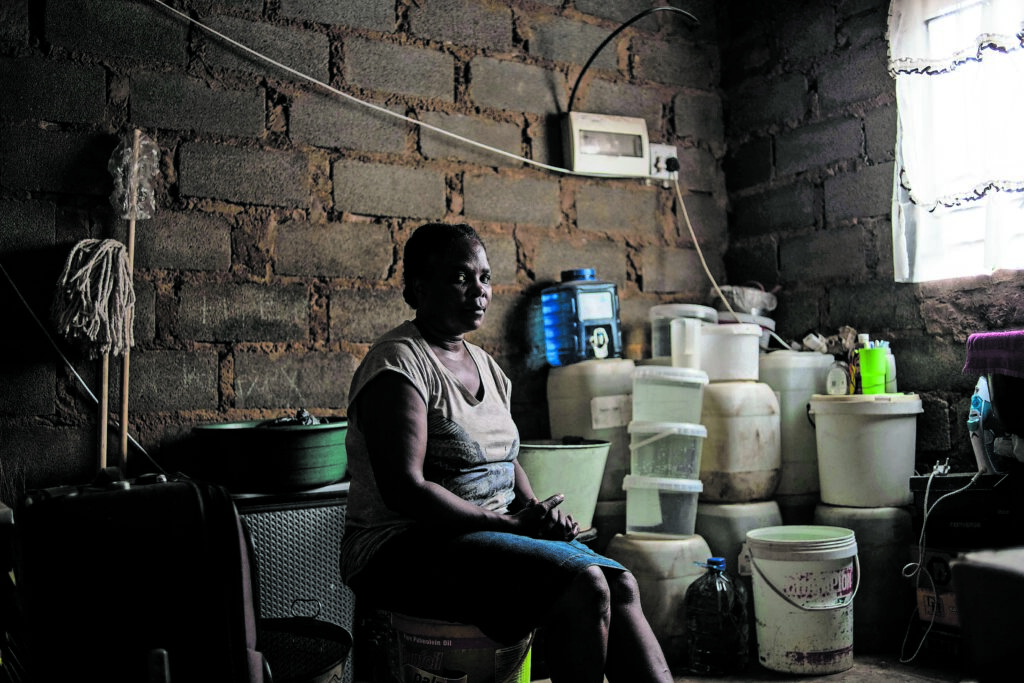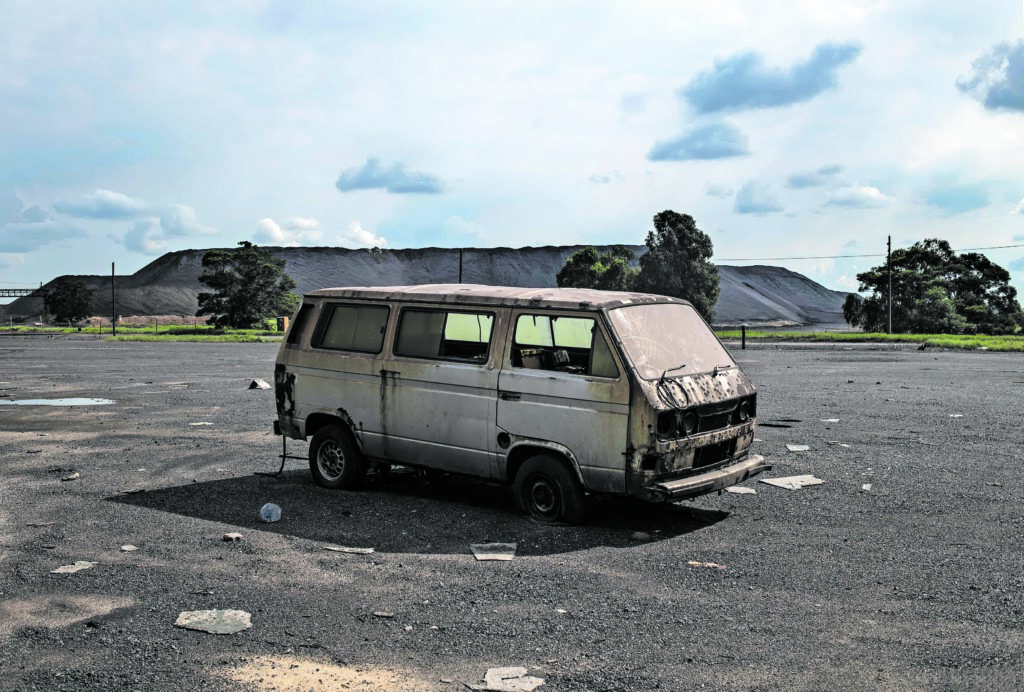Oxygen supplies at Gauteng hospitals remain stable, despite the province being battered by a third wave of the coronavirus.
Mapule Mdhuli has spent the morning meticulously cleaning her family’s small home in Empumelelweni in Mpumalanga, but a layer of gritty black dust still coats the furniture.
“We’re breathing in this same dust,” says Mdhuli, 25, as she breastfeeds her one-year-old son, Anthony. “It’s all over the house and it’s part of what makes us sick.”
Her mother, a cleaner at a mining company, has placed a red sheet over her cherished wall unit in the lounge to try to shield it from the dust. In a corner of the sparse lounge is another prized possession: a new tumble dryer. “My mom bought it so my baby’s clothes don’t get affected by all the dust outside.”
 Mapule Mdhuli and her son Anthony.
Mapule Mdhuli and her son Anthony.
For Mdhuli, this is all part of trying to “live around” the pollution the family is exposed to in eMalahleni, the “place of coal”, an air pollution hotspot where they inhale some of South Africa’s dirtiest air.
“It’s the same with all the medication I have to take every day for my blocked sinuses, headaches and my painful chest.”
The Deadly Air case
Two years ago, Mdhuli was one of several residents who deposed affidavits in support of the landmark Deadly Air constitutional litigation, launched by environmental justice organisation groundWork and Vukani Environmental Justice Movement in Action, to tackle air pollution on the Mpumalanga Highveld.
Mdhuli’s neighbourhood is surrounded by open-cast coal mines, which unleash dust, while thick black smoke billows from a nearby steel plant. “The air has this metallic smell. It makes me sick, especially at night,” she says.
Mdhuli had missed so many days of school, particularly during winter, that she had to repeat grade 11.
The respondents in the Deadly Air case are: President Cyril Ramaphosa; the minister of the environment, forestry and fisheries, Barbara Creecy; national air quality officer Thuli Khumalo; and the MECs for agriculture and rural development in Gauteng and Mpumalanga.
Vukani and groundWork are represented by the Centre for Environmental Rights (CER).
The CER says people who live and work on the Mpumalanga Highveld “breathe in toxic, polluted air harmful to their health and well-being” every day. This is the basis of the case, which will be heard by the high court in Pretoria in May.
In their papers, Vukani and groundWork have requested the court to declare that the poor ambient air quality in the Highveld Priority Area (HPA) is a violation of the constitutional right to an environment not harmful to health or wellbeing. They also want the court to order the government to take more steps to improve the air quality.
The United Nations Special Rapporteur on Human Rights and the Environment, David Boyd, has been admitted as an amicus curiae (friend of the court) in the case.
Clean-up promise
In November 2007, the department of environmental affairs vowed to clean up the heavily polluted Mpumalanga Highveld, by declaring it South Africa’s second air quality priority area.
The region, which flanks Johannesburg and Pretoria, is home to 12 of Eskom’s 15 coal-fired electricity stations, Sasol’s refinery in Secunda and the NatRef refinery in Sasolburg.
Vukani and groundWork argue that they launched the case because of government’s repeated failure to enforce air quality laws. The applicants cite research by Dr Andy Gray, an expert in air and health risk modelling, who said emissions from these 14 facilities caused between 305 and 650 early deaths in the area in 2016.
Children, older and sick people are being exposed to acute pollution concentrations that can cause asthma attacks and permanent lung problems, his work found.
After numerous delays, the government respondents filed their notice of opposition in September, and were due to file their answering affidavits by the end of last month.
‘Why must we live like this?’
Across the road from Mdhuli’s home, Vukani co-ordinator Promise Mabilo stands in her own small, dark house and points up to her tin roof, covered with white, corrosive blotches.
“That’s acid from the rain,” she says. “There are other houses here that are even worse. I’m not working so what happens when my roof collapses?”
 Promise Mabilo founded the Vukani Environmental Justice Movement to fight air pollution in Mpumalanga.
Promise Mabilo founded the Vukani Environmental Justice Movement to fight air pollution in Mpumalanga.
Her son, Lifa Mnisi, who deposed an affidavit in the Deadly Air case, suffers from severe asthma. Though it’s been more than 20 years since his diagnosis, Mabilo still struggles to help him when he can’t breathe.
“Because I don’t have money, I was unable to provide the proper medi-cation prescribed for him by the good doctors for all these years. He is using two inhalers now every day and it costs R100, which is a lot,” she said. “People are dying slowly due to the poor quality air around the area.”
Doctors have told her and other families in the area the only solution is to move from eMalahleni.
“Where are you going to start life without money?” asks Mabilo. “We have to live with this pollution — and fight.”
In the nearby township of Vosman, Mbali Mathebula’s seven-year-old asthmatic daughter, Princess, asks when she can return to school. Mathebula can’t answer her.
“Both my daughters have asthma and they weren’t born with it,” she says. “I’m not working and I can’t afford to buy the medicine they need or the nebuliser the hospital told me to get. My daughter is often too sick to go to school, especially in winter, and she failed grade 1.”
Minister’s response
In her 260-page replying affidavit, Creecy noted the “emotive description” by the applicants of Eskom’s coal-fired power stations as dirty.
“Those dirty coal-fired power stations provide the electricity, which enabled the applicants and their attorneys to type and print out the very papers upon which they rely in this application.”
Every megawatt of electricity generated by Eskom is critical for the needs of the republic and its people, Creecy said.
She stated that air quality in the HPA has “improved in general” since the approval of the Highveld Plan, while hotspots remain not in compliance with the national ambient air quality standards.
Creecy noted that she “does not have a free hand to singularly jump in and resolve this probably by simply making regulations at will as if mere regulations will overnight cause the problem to be resolved”.
The applicants, she said, have not submitted any forensic evidence to show factual causation between the air pollution and the alleged harm suffered by any particular individual to his or her health and wellbeing.
‘We’re fighting for clean air’
In Vosman, Cebile Faith Mkhwanazi watches her two asthmatic children play in the yard. “Yesterday my son was complaining about chest pain and struggling to breathe,” she says.
 Black dust coats people’s homes and lungs. The Deadly Air court case applicants argue that toxic air violates people’s constitutional right to an environment that does not not harm them.
Black dust coats people’s homes and lungs. The Deadly Air court case applicants argue that toxic air violates people’s constitutional right to an environment that does not not harm them.
Her children often miss school in winter. “There is too much pollution and they get very sick, usually at the same time. I wish at this [Deadly Air] case the government can say something that we can be happy about, that will change my children’s lives.
“Yes, the government can create job opportunities for us because we’re not working. But our problem is with the air, not jobs. The main problem here is the air pollution.”
She tells of how at the local hospital she has to “beg” for medication and she can’t give her children their asthma inhalers every day because she can’t afford it.
“This government is failing us. As victims of poor air quality, we are fighting for our children and all children in South Africa breathing this dirty air — that’s why this case is so important.”